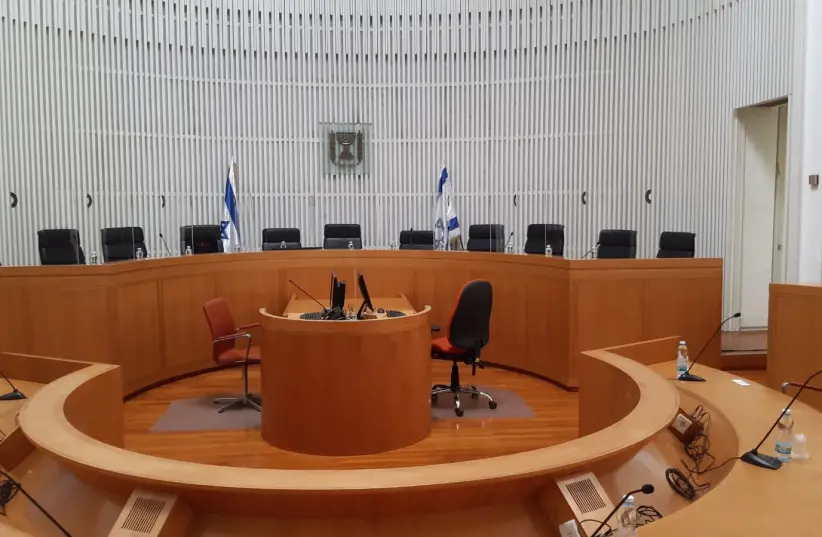HIGH COURT NIXES SETTLEMENTS LAW AS ANNEXATION APPROACHES
by Yonah Jeremy Bob, June 9, 2020
The law would have retroactively legalized over 4,000 unauthorized settler units in the West Bank.

The High Court of Justice on Tuesday night struck down the 2017 Settlements Law as unconstitutional as the country nears a major decision about annexation[1] in the West Bank.
The law, which in a rare situation, was opposed by Attorney-General Avichai Mandelblit, would have retroactively legalized over 4,000 unauthorized settler units in the West Bank.
Allowing the law to stand would have been a sea change, which critics had called creeping annexation – though many unauthorized outposts would still not be legalized and there would not have been formal annexation.
The 8-1 decision – with only Justice Noam Sohlberg in dissent – is sure to bring down a new wave of condemnations from the country’s right-wing which viewed the law as a singular achievement.
However, at the same time, the ruling could bolster the High Court’s independence before the International Criminal Court[2] which is currently deciding whether to dive deeper into the Israeli-Palestinian conflict.
The Likud expressed disappointment with the bill’s cancellation and said another bill would be drafted in its place. Likud MK Nir Barkat said the time had come to restore the proper balance of power between the branches of government.
Blue and White responded that the decision must be respected and implemented.
"The current version of the bill went against legal norms and that was already clear when it was passed in the Knesset," the party said.
Knesset Speaker Yariv Levin said the court "trampled Israeli democracy and basic human rights” and warned that "the Knesset will not accept the continued harm to its authority."
The opposing viewpoints of Likud and Blue and White on the bill are likely to cause tensions that could result in a coalition crisis.
Yamina MK Bezalel Smotrich, who was the bill’s sponsor, said the court has lost its shame and waited for a weak government to issue a left-wing extremist ruling. He said the High Court had been trampling the rights of the residents of Judea and Samaria for too long.
Meretz leader Nitzan Horowitz praised the court’s decision, calling the disqualified law racist and aimed at taking Palestinian land for building settlements. He said the message of the law’s cancellation was that the planned West Bank annexation should not be carried out.
Joint List leader Ayman Odeh called the ruling "an important victory for the Palestinians whose land was stolen by the settlers."
The headline of the current debate before the High Court is deciding whether a State of Palestine exists which can grant it basic jurisdiction over alleged Israeli war crimes.
Yet, another massive issue is whether the ICC believes Israel’s court system is independent enough to probe potential illegalities.
The High Court’s decision to beat back the retroactive legalization of 4,000 housing units could significantly boost its credibility and encourage the ICC to leave judging the settlement enterprise and the 2014 Gaza War disputes to Israel’s judicial system and not to interfere.
On the flip side, if the government decides to proceed with annexation in early July, that decision could overtake the High Court and encourage the ICC to pursue Israel for the alleged war crime of taking Palestinian land.
For its part, Israel would argue that not only does the ICC have no jurisdiction, but that any of the areas it would annex, it has a right to the land under international law since UN Resolution 242 says that the West Bank will be divided between Israel and the Palestinians through negotiations.
Summarizing, the High Court said it was declaring the law unconstitutional since the law, "retroactively legalizes illegal building by Jews in the area [West Bank]," while having "deeply harmful consequences for the substantive rights of Palestinians."
Regarding the High Court decision, Yesh Din lawyer Michael Sfard, who represents 40 Palestinian local councils who want their land and not compensation, said that it was incredibly significant that the justices also disqualified the law on grounds closer to what he recommended than on the grounds recommended by the attorney-general.
For example, whereas Mandelblit said that the law’s biggest issue was its blanket approach to ousting Palestinian rights from land where Jews later moved, Sfard said that there was an additional constitutional and international law problem.
He argued that the status of the IDF Central Commander as legislator of the West Bank meant that the IDF has defined the West Bank as being under the international law of belligerent occupation could not simply be altered by a piecemeal Knesset law.
Yesh Din, Peace Now, ACRI, Adalah and a large range of other human-rights groups petitioned against the law shortly after it passed in February 2017.
Footnotes
[1] https://www.jpost.com/Tags/Annexation
[2] https://www.jpost.com/Tags/international-criminal-court
Yonah Jeremy Bob is the Jerusalem Post's intelligence, terrorism and legal analyst and Literary Editor. He covers the Mossad, a variety of intelligence, terrorism, cyber and weapons of mass destruction issues in Israel and internationally as well as Shin Bet interrogations and indictments.
This article was published by the Jerusalem Post
and is archived at
https://www.jpost.com/israel-news/high-court-nixes-settlements-law-as-annexation-approaches-630865.
Gil Hoffman contributed to this report.
It is archived at Think-Israel at
http://www.think-israel.org/bob.settlementlawstruckdown.